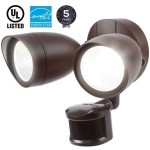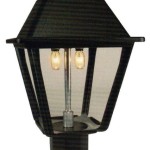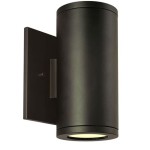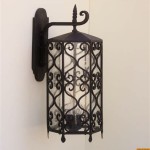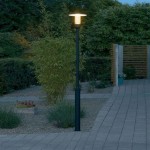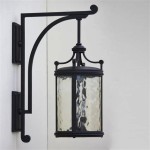Outdoor Mercury Vapor Lights: A Comprehensive Guide
Outdoor mercury vapor lights, also known as MV lamps, have been a staple in outdoor lighting for decades. They are commonly used in parking lots, streetlights, and other commercial applications due to their long lifespan, high efficiency, and bright, bluish-white light. While they have been popular for their practicality, advancements in lighting technology have led to the emergence of alternatives that offer improved performance and reduced environmental impact. This article provides a comprehensive overview of outdoor mercury vapor lights, covering their characteristics, advantages, disadvantages, and their place in the contemporary lighting landscape.
Characteristics of Mercury Vapor Lights
Mercury vapor lights utilize a high-pressure discharge lamp filled with mercury vapor. When electricity passes through the lamp, it excites the mercury atoms, causing them to emit ultraviolet radiation. This radiation is then converted into visible light by a phosphor coating on the inner surface of the lamp. Key characteristics of mercury vapor lights include:
- High Efficiency: Compared to traditional incandescent bulbs, mercury vapor lights are highly energy-efficient, consuming less electricity to produce the same amount of light.
- Long Lifespan: With proper use and maintenance, mercury vapor lights typically last for 12,000 to 24,000 hours, significantly longer than incandescent bulbs.
- Bright White Light: Mercury vapor lights emit a bright, bluish-white light, providing excellent visibility for outdoor applications.
- Warm-up Time: Mercury vapor lights require a few minutes to reach full brightness after being turned on. This is due to the time it takes for the mercury vapor to heat up and reach the necessary pressure for light emission.
- Color Rendering: Mercury vapor lights have a poor color rendering index (CRI), meaning they do not accurately reproduce colors. This can be a drawback in applications where accurate color perception is important.
Advantages of Outdoor Mercury Vapor Lights
Despite the emergence of newer lighting technologies, outdoor mercury vapor lights continue to offer several advantages, making them a viable option for certain applications:
- Cost-Effectiveness: Mercury vapor lights are generally less expensive than LED lights, particularly for initial purchase and setup.
- High Lumens: Mercury vapor lights produce high lumen output, providing excellent brightness for outdoor illumination.
- Durability: These lamps are known for their durability and resistance to harsh weather conditions.
- Wide Availability: Mercury vapor lights are readily available and widely used, making replacements and maintenance relatively straightforward.
Disadvantages of Outdoor Mercury Vapor Lights
While mercury vapor lights offer several advantages, they also have some notable drawbacks that have contributed to their declining popularity:
- Environmental Impact: Mercury vapor lights contain mercury, a hazardous substance that can pose environmental risks if not disposed of properly. The mercury released during disposal and the production of the lamps can contaminate soil and water sources.
- Poor Color Rendering: The bluish-white light emitted by mercury vapor lights has a poor CRI, making it unsuitable for applications where accurate color perception is essential.
- High Startup Time: The long warm-up time can be inconvenient in situations where immediate illumination is required.
- Fragile Glass Bulbs: Mercury vapor lights use fragile glass bulbs that are susceptible to damage, especially in outdoor environments.
- Dimming Capabilities: Mercury vapor lights are not easily dimmable, limiting their flexibility in controlling light levels.
Alternatives to Outdoor Mercury Vapor Lights
The advancements in lighting technology have led to the development of energy-efficient, environmentally friendly, and versatile alternatives to mercury vapor lights. These alternatives offer improved performance and address the drawbacks of mercury vapor lights:
- LED Lights: LED lights are highly energy-efficient, long-lasting, and have a wide range of color temperatures and CRI options. They are also environmentally friendly, containing no hazardous materials.
- High-Pressure Sodium Lights: High-pressure sodium lights offer high efficiency and a warm, yellowish light, making them suitable for certain applications like street lighting.
- Metal Halide Lights: Metal halide lights provide better color rendering than mercury vapor lights but still contain hazardous materials and have a shorter lifespan.
The choice of lighting technology for outdoor applications depends on specific requirements such as cost, efficiency, color rendering, and environmental considerations. While mercury vapor lights remain a viable option in some cases, the advancements in LED and other technologies offer superior performance and sustainability, making them increasingly attractive alternatives for outdoor illumination needs.

Mercury Vapor Lamp Wikipedia

Mercury Vapor Lamps What Are They Shine Retrofits Lighting Blog

Mercury Vapor D2d Vs Led Security Lights

The Mercury Vapor Vs Led Debate Action Services Group

Moonlighting Mercury Vapor Lighting Makes Any Home Look Upscale Regardless Of The Size Perfect Lights House Styles

What Is A Mercury Vapor Light Bulb

Moonlighting Mercury Vapor By The Perfect Light Outdoor Lighting Structures

Mercury Vapor Industrial Light And Power

Outdoor 30w Mercury Vapor Led Replacement Street Light China Garden Lamp Made In Com

Mercury Vapor Landscape Lighting Conversion To Led Outdoor
Related Posts

